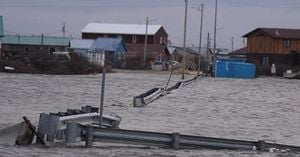A Chinese-affiliated company developing a major resort in Niseko, Hokkaido, is reportedly facing management failure, raising concerns about the potential collapse of what has been dubbed the 'Niseko Bubble.' This bubble economy, characterized by soaring land prices and personnel costs, has been largely driven by an influx of overseas capital.
The news, published on May 7, 2025, highlights the precarious situation of the resort, which has become a focal point in discussions about foreign investment in Japan. The Niseko area, known for its winter sports and luxury accommodations, has seen significant investments from Chinese companies, leading to a rapid increase in real estate values. However, as the management failure of this resort unfolds, it signals a possible turning point for the region's economy.
In recent years, the acquisition of land in Japan by foreign entities, particularly those affiliated with China, has sparked debates in the Japanese Diet. Concerns have been raised about the implications of foreign ownership on national security and local economies. Yuichiro Tamaki, a member of the Democratic Party for the People, emphasized the need for vigilance regarding land purchases in sensitive areas. In April 2025, he pointed out that not only resort areas but also regions surrounding airports, dams, water sources, and hot spring sources are being targeted for acquisition.
The Japanese government has taken steps to address these concerns. In December 2024, it designated 399 locations as 'Special Monitoring Areas' and 'Monitoring Areas,' focusing on crucial facilities and border remote islands. A report indicated that in fiscal year 2023, the largest number of land acquisitions in these designated areas was attributed to Chinese individuals and foreign entities. However, the full extent of land acquisitions outside these areas remains unclear, raising questions about the broader impact of foreign investment.
As the Niseko Bubble shows signs of bursting, the implications for the local economy could be significant. The region, once thriving due to foreign investments, now faces uncertainty as the management of the major resort falters. This situation may lead to a reevaluation of foreign investment policies in Japan, particularly regarding land acquisitions by foreign entities.
The potential collapse of the Niseko resort serves as a stark reminder of the risks associated with rapid economic growth fueled by foreign capital. While the influx of investment has brought prosperity, it has also led to inflated property values and increased living costs for local residents. The delicate balance between attracting foreign investment and protecting national interests is becoming increasingly challenging for Japanese policymakers.
In light of these developments, local businesses and residents are left wondering how the management failure will affect their livelihoods. Many have relied on the economic boom generated by the influx of tourists and investments, but with the current uncertainty, there is growing anxiety about the future. The Niseko area's reputation as a premier resort destination may be at stake, and the repercussions could extend beyond the immediate community.
As discussions continue in the Diet regarding foreign land ownership, it remains to be seen what measures the government will implement to safeguard Japan's interests. The call for thorough investigations into land acquisitions, particularly in sensitive areas, is gaining momentum. Tamaki's assertion that "we must investigate, even if it takes time and money, to protect Japanese land" resonates with many who are concerned about the implications of unchecked foreign investment.
In summary, the management failure of the Chinese-affiliated resort in Niseko has ignited a broader conversation about foreign investment in Japan. The potential collapse of the 'Niseko Bubble' serves as a cautionary tale, prompting calls for increased scrutiny and regulation of land acquisitions by foreign entities. As the situation unfolds, the future of Niseko and its economy hangs in the balance, with local residents and businesses hoping for a resolution that prioritizes their interests.




